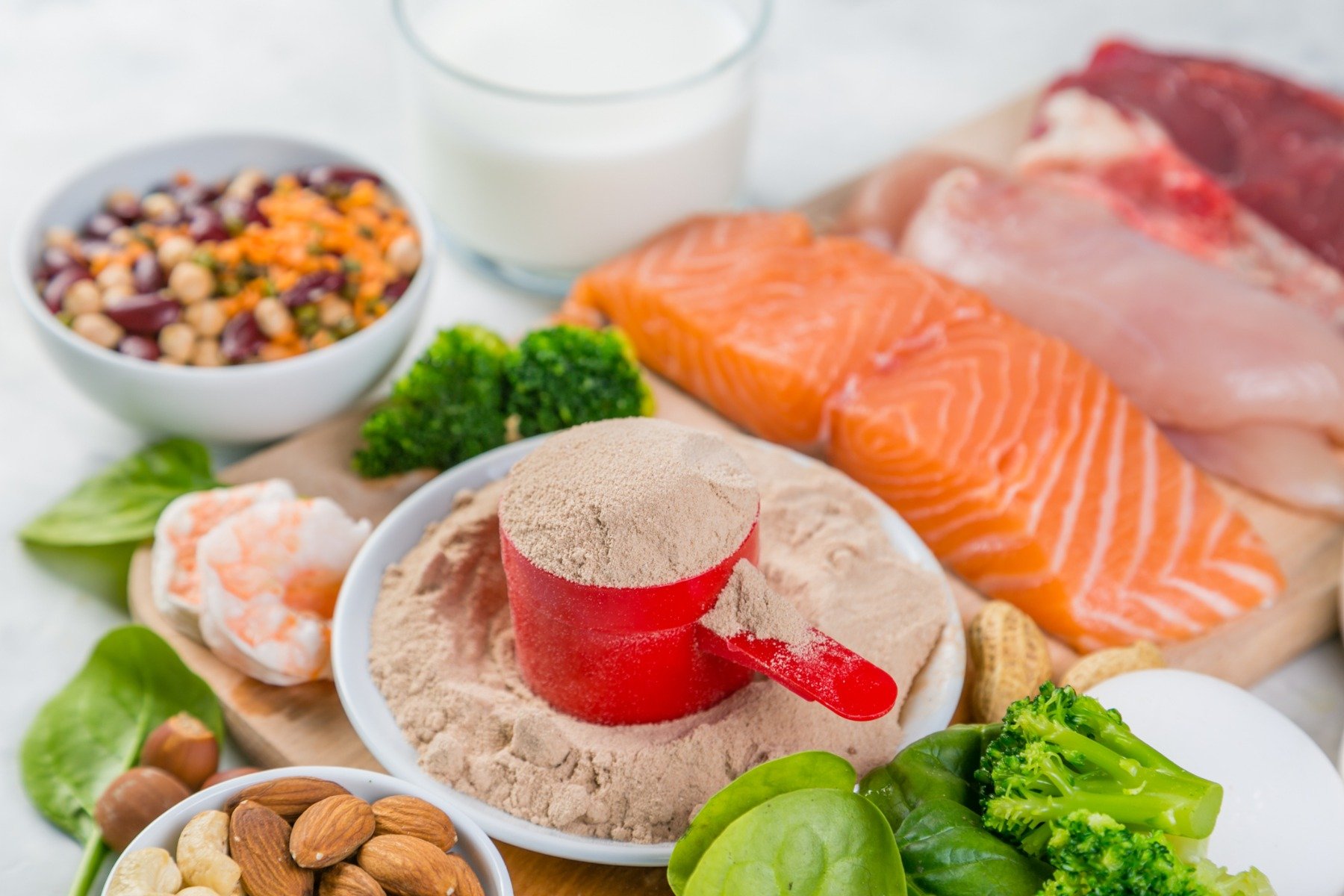Table of Contents
Muscle building is based on hard training, a balanced diet, but nutritional supplements can help too. For effective utilization of supplements, it is necessary to understand how the individual chemical processes in the body, which influence muscle formation and reduction of body fat, take place in the body. Here are some facts about leucine, an amino acid that is crucial for protein synthesis.
What is leucine?
Leucine is an essential amino acid that the body cannot produce itself. There are 9 essential amino acids and leucine is one of the most important of them, so it is important to take it from food or supplements.
Leucine is a part of BCAA, a branched-chain amino acid. Specifically, these are the three amino acids – leucine, isoleucine and valine – which break down in the muscles and not in the liver. BCAAs help increase energy production and muscle synthesis during exercise.
Leucine is considered to be the main and most important BCAA amino acid for the many benefits it provides to the body. It is particularly popular for its ability to build muscles and activate a protein known as mTOR, which triggers muscle protein synthesis. Of course, isoleucine and valine also help activate mTOR, but not in such strength as leucine. [1] [2]
Leucine also differs from the other two amino acids of BCAA in that it has been most investigated in the isolated state, not only as part of BCAA. Researches on leucine mostly focus on muscle protein synthesis and its effects in the anabolic process or the ability to stimulate glucose and insulin.

Leucine is classified in two forms as:
- L-leucine – a natural version of the amino acid leucine, which is found in proteins in the body and is most commonly used as a nutritional supplement
- D-leucine – is a form of L-leucine, which is produced in laboratories and also serves to prepare nutritional supplements
The benefits of leucine include increased fat reduction, improved muscle regeneration or improved physical performance. We will discuss more about the benefits of leucine in the article below. [1]
6 benefits of taking leucine
Leucine has many positive effects, which can be enjoyed especially by athletes. If you want to gain muscle mass while losing excess fat or looking for an effective nutritional supplement to regenerate aching muscles, be sure to continue reading. We will explain how you can effectively use leucine for muscle mass growth and what are its scientifically proven benefits.

1. Promotes muscle growth
Leucine enjoys great popularity among athletes and bodybuilders because of its ability to significantly support muscle gain. It is one of the key amino acids involved in protein synthesis and therefore helps to start muscle growth after training. [5]
How does it work? It has been shown that leucine can activate mTOR, a protein responsible for protein synthesis. MTOR acts as an energy and nutrient sensor from available amino acids, specifically leucine, which then triggers protein synthesis. Activation of mTOR is crucial for enlargement of the skeletal muscle. [22]
This means that a low leucine level in the bloodstream indicates that there is not enough protein in the body to synthesize new muscle proteins, and then mTOR is deactivated. On the other hand, if the leucine level increases, mTOR receives a signal that there is enough protein in the body to synthesize new skeletal muscle proteins, then it activates and triggers protein synthesis.

The results of the studies do not show clearly how leucine can activate mTOR. However, they confirm that mTOR is sensitive to leucine concentration and ATP (adenosine triphosphate) levels. [23] [24] The role of leucine in this process is not limited to acting as a driving force for protein synthesis, but leucine regulates the entire muscle building process. The higher the leucine level, the greater the muscle formation. [7] Studies confirm that leucine alone is able to increase protein synthesis by up to 25%. [20] Let’s see some examples.
Experts conducted research where the test subjects underwent 45-minute resistance training. Subsequently, these subjects were divided into 3 groups, each receiving a different combination of supplements. One group supplemented only with carbohydrates, the other group received carbohydrates and 30 g protein, and the third group consumed carbohydrates, protein and leucine. [25]
The result of the study was that the third group that received a carbohydrates + protein + leucine combination reduced protein breakdown and increased protein synthesis to a greater extent than a carbohydrate-protein combination. At the same time, the results of the third group had a much better effect than the first group, which only received carbohydrates. [25]
A possible explanation for this phenomenon is that the protein needs a long time to get out of the stomach into the intestines and finally into the bloodstream. Even with a rapidly absorbable protein such as whey protein, it may take hours for leucine to get into the bloodstream. In contrast, a single leucine supplement is absorbed more rapidly, thereby increasing plasma leucine levels and activating the aforementioned anabolic pathways. [25]
You might be interested in these products:
Another example is the 2017 study, which also tested the effect of different combinations of supplements at different doses on enhancing protein synthesis. 40 men with an average age of 21 years underwent this research and were divided into 3 groups. The first group received 25 g of whey protein containing 3 g of leucine. The second group consumed only 6.25 g of whey protein containing 0.75 g of leucine and the third group consumed 6.25 g of whey protein together with BCAA supplement, and thus a total of 5 g of leucine. [21]
The results showed that 6.25 g of whey protein together with a high dose of 5 g leucine were more anabolic than the same dose of protein with less leucine (3 g). In addition, this dose was as effective for enhancing protein synthesis as a high dose of 25 g protein. It follows that an increased dose of leucine can compensate for the optimum dose of whey protein while protein synthesis will be equally intense. [21]

2. Improves performance in sports
Not only bodybuilders, but also athletes and beginning athletes can take advantage of leucine, as it moves physical performance to a higher level even in aerobic activities. One study reported that leucine supplementation for six weeks significantly improved endurance and strength in the upper body of canoeists. Similarly, research has confirmed that leucine increased muscle mass and improved functional performance in the elderly. [11] [12]
3. Helps in fat loss
If you’re trying to build muscles while losing your spare tire tummy, leucine is the best choice for you. Indeed, several studies have confirmed that leucine has a potent effect on fat reduction. A 2015 survey showed that the amino acid of leucine reduces fat accumulation and hinders the development of diet-related obesity. [14]
4. Promotes muscle regeneration
Muscle training is a painful consequence of good training. But after a very intense sport activity, destroyed muscles can take you out of your training routine for a few days. Then it is time for leucine. If you are taking it, you don’t need to worry that your fitness goals will be in the foreseeable due to muscle pain.
Promising study results suggest that leucine plays an essential role in muscle recovery. One research confirmed that the consumption of leucine immediately after training helps to regenerate muscles and activate muscle protein synthesis. Another study showed that leucine supplementation improves both recovery and endurance performance of cyclists on the days following training. [15] [16]
5. Stabilizes blood sugar
Hyperglycaemia or high blood sugar can cause fatigue, significant weight loss and increased thirst. However, long-term untreated high blood sugar can have far more serious consequences than nerve damage, kidney problems or the risk of skin infections.
Some research suggests that leucine may be useful in maintaining stable blood sugar levels. The study confirmed that leucine, taken with glucose, helped to stimulate insulin secretion, reducing blood sugar levels in the test subjects. Another study also says that leucine is able to facilitate insulin signaling and glucose uptake to help stabilize blood sugar. [17] [18]
6. Prevents muscle loss in elderly
Many changes are happening in the body through the aging process. The progressive deterioration of skeletal muscle, also called sarcopenia, is one of the most prominent symptoms of advanced age. This condition can cause weakness and decreased stamina, leading to a decrease in physical activity.
It is leucine that helps to slow muscle damage, thus reducing the symptoms of aging. One study showed that leucine improves muscle synthesis in older adult patients who also received sufficient protein in the diet. Further research published similar results. He found that leucine supplementation is able to reduce the weight loss caused by malnutrition in the elderly. [8] [9]
Sources of leucine
In order to achieve the aforementioned effects of leucine, it is important to take a closer look at its intake. Leucine is naturally found in ordinary foods because it is an integral part of a protein-rich diet. [3]
If you want to calculate the intake of leucine from food, it will be quite challenging, because on the label of ordinary products, you will find only a nutritional amount of protein and not leucine. However, experts claim that the amount of leucine containing proteins is about 5 to 10%. The table below shows the foods with the highest proportion of leucine. Most of them are products that you probably receive every day. [3]

| Whey protein | 10 – 12 g |
| Soy protein | 7,5 – 8,5 g |
| Soya beans | 2,87 g |
| Beef | 1,76 g |
| Peanuts | 1,67 g |
| Salmon | 1,62 g |
| Almonds | 1,49 g |
| Chicken breast | 1,48 g |
| Eggs | 1,4 g |
| Lentil | 0,65 g |
| Chickpeas | 0,63 g |
Daily dose of leucine
The optimal dose of leucine per day is in the range of 2000-5000 mg per day. Leucine should be taken on an empty stomach or with a meal that has a low protein content and therefore less leucine content. [1]
If you exercise and want to effectively use leucine for muscle growth and maximize its effects, you should follow these steps [4]:
- Take 2.5 g of leucine (or 5 g of BCAA) 30 minutes before training to support the anabolic stimulus.
- Combine an additional 5 g of leucine (or 10 g of BCAA) with your protein shake after training. Addition of leucine to whey protein can be very effective to further stimulate protein synthesis.
- Take 5 g of leucine before bedtime to increase the recovery rate after training.
- Consume leucine between meals, as it can help you with a quick muscle recovery. People who are on a diet and are trying to build muscle should therefore include 2-3 grams of leucine between their courses in their diet. This can reduce the potential catabolic effects and prevent muscle breakdown.
Side effects of leucine
In general, leucine does not cause serious side effects unless this is exaggerated by its intake. One very small study of 5 healthy men who received 1250 mg of leucine per kilogram of body weight, and therefore 25 times the estimated average need, found that these high doses of leucine caused an increase in ammonia in the body. As a result of this study, the maximum leucine limit was set at 500 mg / kg of body weight per day. [12]
However, leucine may affect the action of some drugs. For example, a dose of 30 g of leucine daily has adverse effects on vitamin B6 and B3. Excess leucine prevents the body from producing these vitamins, which can lead to diseases due to their deficiency. One of these diseases is pellagra, which is characterized by skin lesions, hair loss and stomach problems. [7] [13]
Consumption of leucine with a source of glucose increases insulin levels and lowers blood sugar levels. The intake of leucine together with diabetic therapy, such as insulin injections, can keep the sugar at a very low level. Therefore, patients suffering from hypoglycaemia should not take leucine. All patients with diabetes should consult their doctor before taking leucine. [7] In addition, pregnant and breastfeeding women should also avoid leucine as a supplement.
We believe that we have offered you guidance on how to make Leucine use even more effective for muscle growth and rapid recovery. Write us in the comments on whether you are supplementing leucine and what your experience is. Please, share the article if it has brought you new information.
[1] Kamal Patel. Leucine. – https://examine.com/supplements/leucine/
[2] Shimomura Y, Yamamoto Y, Bajotto G, Sato J, Murakami T? Shimomura N, Kobayoshi H, Mawatari K. Nutraceutical effects of branched-chain amino acids on skeletal muscle. – https://www.ncbi.nlm.nih.gov/pubmed/16424141
[3] Malia Frey. What is leucine? A guide to leucine foods and leucine supplements – https://www.verywellfit.com/how-to-use-leucine-for-weight-loss-3495727
[4] Jonathan Mike. Supplemental leucine: How it powers muscle growth – https://www.bodybuilding.com/fun/supplemental-leucine-how-it-powers-muscle-growth.html
[5] Mero A. Leucine supplementation and intensive training – https://www.ncbi.nlm.nih.gov/pubmed/10418071
[6] Balage M, Dardevet D. Long-term effects of leucine supplementation on body composition – https://www.ncbi.nlm.nih.gov/pubmed/20110810
[7] Leucine. Dosage, benefits and side effects – https://us.myprotein.com/thezone/supplements/leucine-dosage-benefits-side-effects/
[8] Casperson SL, Sheffield-Moore M, Hewlings SJ, Paddon-Jones D. Leucine supplementation chronically improves muscle protein synthesis in older adults consuming the RDA for protein. – https://www.ncbi.nlm.nih.gov/pubmed/22357161
[9] Rachael Link.Leucine: The muscle-building amino acid your body needs – https://draxe.com/nutrition/leucine/
[10] Dontao J Jr, Pedrosa RG, Cruzat VF, Pires IS, Tirapegui J.Effects of leucine supplementation on the body composition and protein status of rats submitted to food restriction. – https://www.ncbi.nlm.nih.gov/pubmed/16600817/
[11] Joao A. B. Pedroso, Thais T: Zampieri, Jose Donato Jr. Reviewing the effects of l-leucin supplementation in the regulation of food intake, energy balance and glucose homeostasis – https://www.ncbi.nlm.nih.gov/pmc/articles/PMC4446786/
[12] Elango R, Chapman K, Rafi M, Ball RO, Pencharz PB. Determination of the tolerable upper intake level of leucine in acute dietary studies in young men. – https://www.ncbi.nlm.nih.gov/pubmed/22952178
[13] University Rochester medical center.Leucine – https://www.urmc.rochester.edu/encyclopedia/content.aspx?contenttypeid=19&contentid=Leucine
[14] Joao A. B. Pedroso, Thais T: Zampieri, Jose Donato Jr.Reviewing the effects of l-leucin supplementation in the regulation of food intake, energy balance and glucose homeostasis – https://www.ncbi.nlm.nih.gov/pmc/articles/PMC4446786/
[15] Layman DK.Role of leucine in protein metabolism during exercise and recovery. – https://www.ncbi.nlm.nih.gov/pubmed/12501002
[16] Thomson JS, Ali A, Rowlands DS .Leucine-protein supplemented recovery feeding enhances subsequent cycling performance in well-trained men. – https://www.ncbi.nlm.nih.gov/pubmed/21609286
[17] Kalogeropoulou D, Lafave L, Schweim K, Gannon MC, Nuttall FQ - Leucine, when ingested with glucose, synergistically stimulates insulin secretion and lowers blood glucose. – https://www.ncbi.nlm.nih.gov/pubmed/19013300
[18] Liu H, Liu R, Li X, Wang X, May Y, Guo H, Hao L, Yao P, Liu L, Wang D, Yang X. Leucine facilitates the insulin-stimulated glucose uptake and insulin signaling in skeletal muscle cells: involving mTORC1 and mTORC2. – https://www.ncbi.nlm.nih.gov/pubmed/24806638
[19] Joe Cohen. Top 7 health benefits of leucine + side effects – https://selfhacked.com/blog/leucine-health-benefits-side-effects/
[20] Buse MG, Reid SS .Leucine. A possible regulator of protein turnover in muscle. – https://www.ncbi.nlm.nih.gov/pubmed/1237498
[21] Churchward-Venne TA, Breen L, Di Donato DM, Hector AJ, Mitchell CJ, Moore DR? Stellingwerff T, Breuille D, Offord EA, Baker SK, Phillips SM. Leucine supplementation of a low-protein mixed macronutrient beverage enhances myofibrillar protein synthesis in young men: a double-blind, randomized trial.– https://www.ncbi.nlm.nih.gov/pubmed/24284442
[22] Anthony JC, Yoshizawa F, Anthony TG, Vary TC, Jefferson LS, Kimball SROV. Leucine stimulates translation initiation in skeletal muscle of postabsorptive rats viac a rapamycin-sensitive pathway. – https://www.ncbi.nlm.nih.gov/pubmed/11015466
[23] Crozier SJ, Kimball SR, Emmert SW, Anthony JC, Jefferson LS. Oral leucine administration stimulates protein synthesis in rat skeletal muscle. – https://www.ncbi.nlm.nih.gov/pubmed/15735066
[24] Bolster DR, Crozier SJ, Kimball SR, Jefferson LS. AMP-activated protein kinase supresses protein synthesis in rat skeletal muscle through down-regulated mammalian target of rapamycin (mTOR) signaling.– https://www.ncbi.nlm.nih.gov/pubmed/11997383
[25] Koopman R, Wagenmakers AJ, Manders RJ, Zorenc AH, Senden JM, Gorselink M, Keizer HA, van Loon LJ. Combined ingestion of protein and free leucine with carbohydrate increases postexercise muscle protein synthesis in vivo in male subjects. – https://www.ncbi.nlm.nih.gov/pubmed/1556225


Add a comment